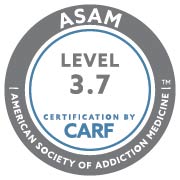Alcohol consumption is a common part of many cultures around the world. Whether it’s at social events or for relaxation at home, drinking alcohol is a routine activity for many people. However, while moderate drinking can be safe for some, it can turn into a dangerous addiction for others. For women, the risks associated with alcohol consumption can be particularly significant due to biological and social factors.
So, is alcohol addictive? Absolutely. Below, we’ll explore the causes, symptoms, and effects of alcohol dependency as well as approaches to treatment and recovery.

What is Alcoholism?
Alcoholism, also known as alcohol use disorder (AUD), is a chronic condition where a person cannot control their drinking, or can’t stop drinking once they’ve started. Alcohol dependency affects both the body and the mind, leading to severe health problems, strained relationships, and a decline in overall well-being. Understanding what alcoholism is can help in recognizing the signs and seeking timely help.
Alcoholism and Women
Alcohol addiction can affect anyone, but women face unique challenges. Biological differences mean that women can become addicted to alcohol more quickly than men. Women are also more likely to experience certain health problems related to alcohol, such as liver disease, heart disease, and brain damage.
Social and psychological factors, such as trauma, stressful caregiving responsibilities, and mental health issues, may lead to the development of alcohol dependency in women. Understanding these unique challenges is important for receiving effective support and treatment.

What Are the Reasons for Alcoholism?
Is alcohol addictive? Yes. Below, we’ll dive into some of the causes of alcoholism to help you understand where it comes from.
Social Factors
Peer pressure, social gatherings, and cultural norms often encourage excessive drinking. People might drink more to fit in or to feel more comfortable in social settings.
Psychological Factors
Women are often balancing work, family, and personal responsibilities, which can lead to stress, anxiety, depression, or other mental health issues. Drinking can temporarily relieve these feelings, but it can quickly lead to dependency to manage your emotions.
Environmental Factors
Growing up in a household where drinking is common can increase the risk of developing alcohol dependence. Additionally, environments where alcohol is easily accessible can contribute to the onset of alcoholism.
Symptoms of Alcoholism
Worried you or a loved one might be struggling with alcoholism? Here are several symptoms of alcoholism to look for.
Physical Signs
Some physical symptoms of alcoholism include bloodshot eyes, slurred speech, and poor coordination. Women might also experience health issues related to reproductive health, which can be exacerbated by excessive drinking.
Emotional Changes
Alcoholism can lead to significant emotional changes such as mood swings, irritability, and depression. Women may experience heightened emotional sensitivity and may use alcohol as a way to self-medicate for these emotional challenges.
Behavioral Signs
Behavioral changes are also common. These can include secretive behavior, neglecting responsibilities, and an increased tolerance to alcohol. Over time, a person may need to drink more to achieve the same effects, indicating the development of dependency.
Effects of Alcohol Addiction on Women
Recognizing the signs of alcohol abuse and seeking help early can make a world of difference in preventing its serious outcomes and supporting your overall well-being. Let’s explore the potential physical, mental, and other consequences of alcohol addiction on women.
Physical Health Issues
Regular drinking can seriously harm your health. Women are more likely to develop liver diseases like cirrhosis and heart problems, even with less alcohol. There’s also a higher risk of breast cancer and other cancers. Because women metabolize alcohol differently, it can cause more severe organ damage.
Mental Health Problems
Alcohol can greatly affect your mental health. You might experience anxiety, depression, and mood swings. Women’s brains are more vulnerable to alcohol, leading to memory issues and poor decision-making. Hormonal changes can make these problems worse.
Pregnancy Complications
Chronic drinking can mess with your menstrual cycle and lower fertility. If you’re pregnant, alcohol can cause serious issues like fetal alcohol spectrum disorder (FASD) and increase the risk of miscarriage and preterm birth.
Other Consequences
Alcohol addiction can strain your relationships and affect your job. You might neglect family duties and face isolation. At work, addiction can lead to decreased productivity and job loss. Women are also more prone to blackouts and dehydration, disrupting daily life.
Alcoholism and Breast Cancer
If you’re a woman who drinks regularly, it’s important to know that alcohol significantly increases the risk of breast cancer. Research indicates that even drinking less than 1 ounce of alcohol daily can increase your risk. Alcohol affects your body’s hormone levels, particularly estrogen, which can promote the growth of breast cancer cells.
The more you drink, the higher your risk becomes. If you’re concerned about your drinking habits, reaching out for support can be a vital step in reducing your risk and improving your overall well-being.
Approaches to Treatment
Although the symptoms and effects of alcohol addiction can be severe, recovery is possible. There is hope for a future free from addiction.
- Detox: The first step in recovery is detox, where the body is safely cleansed of alcohol under medical supervision. This helps manage withdrawal symptoms and prepares the individual for further treatment.
- Residential Treatment: Residential treatment provides intensive therapy sessions and holistic practices designed to heal the mind, body, and spirit. Choosing an all-female environment can be helpful, creating a safe and supportive space to discuss the aspects of addiction that affect women differently than men.
- Therapy Sessions: Therapy—such as individual counseling or group therapy—addresses the root causes of addiction. These sessions help women understand their addiction and develop strategies for maintaining sobriety.
- Holistic Practices: Activities like yoga, meditation, and nutrition counseling are also integrated into the treatment plan. These practices support overall well-being and help women build a balanced and healthy lifestyle.

Moving Forward with Recovery
Alcohol addiction is a serious condition that requires attention and care. Understanding what alcoholism is, recognizing the symptoms, and knowing the reasons for alcoholism are vital steps in addressing the issue.
For women, the journey to recovery can be particularly challenging due to unique biological and social factors. If you or a loved one is struggling with alcohol addiction, don’t hesitate to seek help. At Casa Capri Recovery, we provide a compassionate, women-centric environment to help you heal and rebuild your life. Contact us and begin your journey toward recovery today.
Frequently Asked Questions
1. Is alcohol addictive?
Yes, alcohol is addictive. Alcohol addiction, also known as alcohol use disorder (AUD), occurs when someone cannot control their drinking and continues to drink despite negative consequences.
2. How addictive is alcohol?
Alcohol can be very addictive, especially with frequent and heavy use. It affects the brain’s reward system, leading to physical and mental dependence.
3. What are the symptoms of alcoholism?
Symptoms of alcoholism include needing more alcohol to get the same effect, feeling anxious or irritable when not drinking, neglecting responsibilities, and continuing to drink even when it causes problems. Emotional changes like mood swings and physical signs like poor coordination are also common.
4. Why do people become addicted to alcohol?
People can become addicted to alcohol due to social, psychological, and environmental factors. Peer pressure, stress, anxiety, and living in an environment where drinking is common all contribute to alcohol addiction.
weeks.
5. How does alcohol addiction affect women differently?
Women may become addicted to alcohol more quickly than men and are more likely to suffer health problems like liver disease, heart disease, and mental health issues. Social pressures and caregiving responsibilities can also make recovery more challenging for women.
6. What are the health risks for women with alcoholism?
Women with alcoholism face higher risks of liver disease, heart disease, brain damage, and mental health disorders. Alcohol can also worsen reproductive health issues.
7. What treatment options are available for alcohol addiction?
Treatment for alcohol addiction includes detox to safely remove alcohol from the body, residential treatment in a supportive environment, various types of therapy (individual, group, family), and holistic practices like yoga, meditation, and nutrition counseling.
















